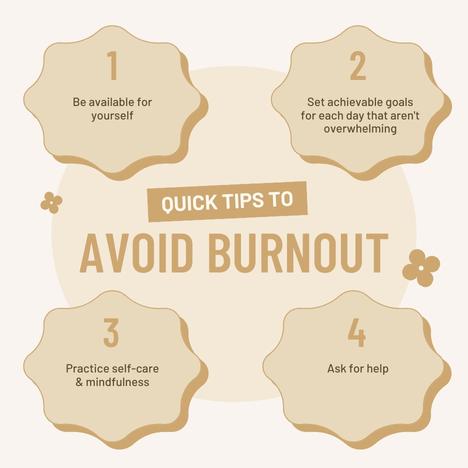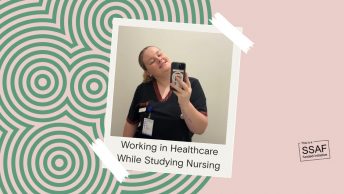Written by Remy Naughton
Nearly every university student you could speak to has experienced some form of academic burnout.
At times, it feels like it has consumed you and you are unable to get out of the fatigued hole you find yourself in.
However, it does not define you and there are ways to dig yourself out.

What is academic burnout?
Academic burnout is the negative emotional, physical and mental reaction to prolonged study that results in frustration, lack of motivation and reduced ability in an academic setting.
Some say academic burnout makes them feel tired, and anxious and find that they cannot focus on anything.
Everyone has a different experience on how their burnout came about and what they did to overcome it.
My experience
My academic exhaustion began during Session 3 of 2022.
I am a student studying for a Bachelor of Communications specialising in Journalism on the Bathurst campus.
At the time of Session 3, I was working five jobs and did not have any time to myself. Even when I went to visit my family, I took up an internship to further my future career prospects.
At the time, I thought that being super busy was good as I was gaining experience and kicking goals that were very valuable however, in reality, I was constantly exhausted, I did not have time for friends and family or more importantly, for myself.
Throughout Session One of this year, I kept all five jobs and continued studying full-time, which was the start of my downfall.
I was not doing well in my studies which caused me stress as I had done very well the year previous.
I started to hate the course that I was once very fond of and wanted to desperately give it up.
I had no motivation to do my studies as I was so exhausted after a workday, which started the decline in my marks.
Through conversations with friends and family, I found that I was experiencing academic burnout.

How to recover from burnout?
You need to remember that you aren’t your academic burnout, it is just something you are currently dealing with.
Ask for Help
You are not on your own, everyone has dealt with some type of burnout. The best tip I could give is to have open conversations with your family, friends and your lecturers.
They are your best ally to help you in every situation.
We are lucky we go to a regional university where we can speak to lecturers as we have smaller cohorts than universities that are in metropolitan areas.
Being honest about your situation allows not only you, but the people around you to understand what you are going through. If you start to have dark thoughts, make sure you go to the GP to get a mental health plan.

Practice self-care and mindfulness
Assess how you take care of yourself (both physically and mentally) and check in with yourself throughout the day to see how you are going.
Mindfulness is the awareness of yourself and the environment. It allows you to stay focused in the present in the moment without mentally drifting from that experience.
Set reasonable goals
You are not going to be the best at the future career you want tomorrow. It takes time and patience to build the skills you need to be YOUR best.
Focus on time management
Create a calendar for your work schedule, when you are planning to study, and when you are going to take time for yourself.
Be available for yourself
Find hobbies you enjoy and ensure you have time away from your studies and work!
For myself, I joined the local AFL club. For yourself, it could be other sports, arts and crafts, etc.
There is a path out
Remember you will be okay and there is a path out of what can sometimes feel like being stuck in an ever-looping Groundhog Day.
Useful links
If you wish to make an appointment with the Charles Sturt counsellors click here.










